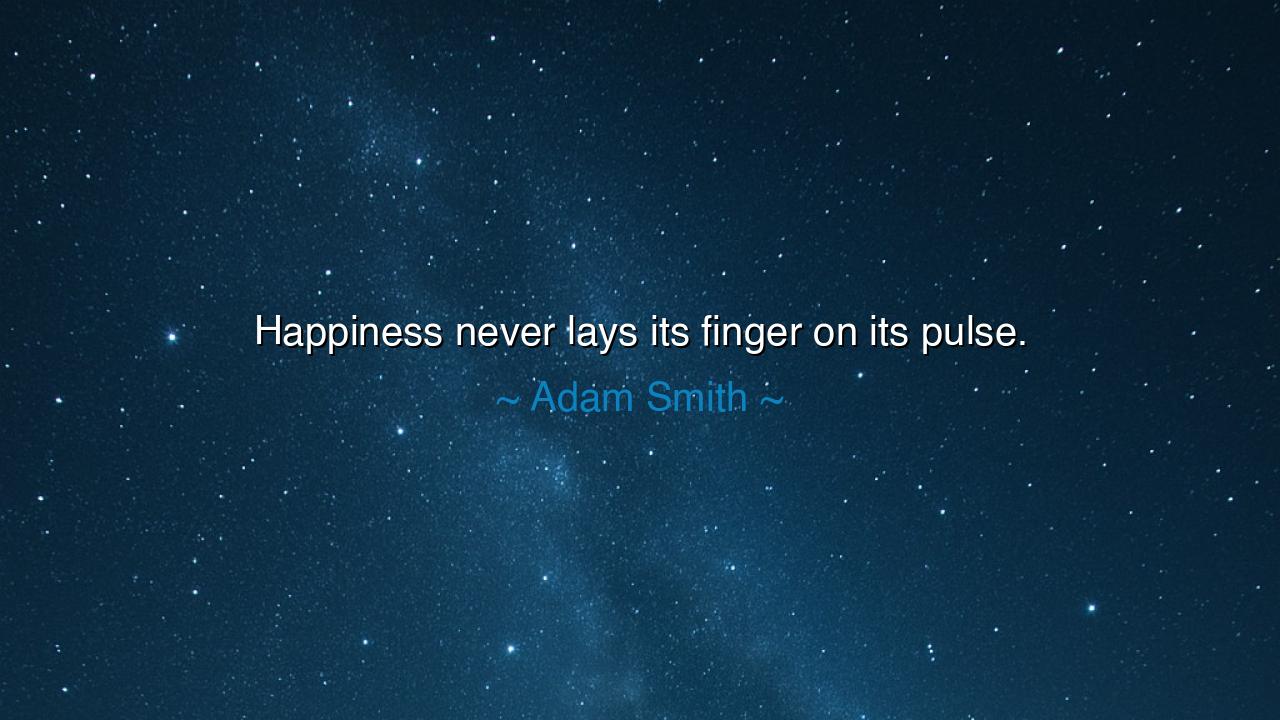
Happiness never lays its finger on its pulse.






“Happiness never lays its finger on its pulse.” — Thus wrote Adam Smith, the philosopher of reason and the gentle observer of the human heart. In this brief yet profound saying lies a truth subtle as breath and eternal as the soul’s longing: happiness is not found in self-examination, but in the unselfconscious rhythm of living. Smith, who explored both the wealth of nations and the wealth of the spirit, understood that joy is not something we can measure, analyze, or hold. It disappears the moment we try to capture it — for happiness, like a melody, exists only while it is being played.
The origin of this quote is rooted in Smith’s reflections on moral philosophy and the natural motions of human life. He saw that true happiness arises when one’s mind and actions flow freely in harmony with purpose, affection, and virtue. The instant we stop to question, “Am I happy?” we break that flow. It is as if the heart, which beats by its own quiet wisdom, were suddenly commanded to beat consciously — and thus falters. In this way, Smith teaches that happiness cannot be manufactured or dissected. It must be lived, not studied; felt, not proven. The one who constantly checks the pulse of happiness will find it gone.
The ancients understood this long before. The Stoics of old, like Marcus Aurelius, spoke of tranquility — not as a possession, but as a state of alignment between inner order and outer duty. When the emperor mused upon the fleeting nature of joy, he never asked himself, “Am I happy?” Rather, he asked, “Am I doing what is right?” For happiness, to the wise, is the shadow cast by virtue. It follows those who walk steadily in truth, and it vanishes from those who turn to chase it. Thus, Smith’s wisdom joins the chorus of the ages: that the mind at peace is never aware of its peace, just as a healthy body forgets the beating of its heart.
Think of Helen Keller, who, though blind and deaf, radiated a joy deeper than many who see and hear. She did not spend her days pondering whether she was happy; she was too busy living — learning, striving, loving, teaching. Her happiness flowed from her labor, from her service to others, and from her gratitude for existence itself. She did not “lay her finger upon her pulse”; she simply allowed her heart to beat in the rhythm of purpose. Through her, we see Smith’s truth illuminated — that happiness is a current, not a trophy, and that it vanishes when we stop to grasp it.
Smith’s insight also reveals a warning to the restless modern soul: the more we chase happiness, the more we lose it. The age of consumption, of endless reflection and comparison, teaches us to measure our lives as if joy were a commodity. But happiness, like the wind, is felt only when we move with it. It is born in action — in kindness given freely, in love shared, in work done with care. The moment we withdraw from the dance of life to question our joy, the music fades. Happiness is unselfconscious, like the laughter of a child or the quiet contentment of a craftsman absorbed in his task.
And yet, Smith does not say that we must ignore happiness; he says only that we must trust it. To live well is to live fully, without obsession over one’s own well-being. Let happiness come as dawn comes — naturally, silently, inevitably — to those who keep their lamps lit through the night. When the heart is busy with love, and the mind with purpose, joy slips in unnoticed. We do not need to measure it; we need only to continue breathing, working, giving. The pulse beats best when it is left to its own divine rhythm.
So, my listener of the present age, take this lesson as both comfort and command: Do not stop to feel for your happiness. Live instead in such a way that happiness lives through you. Do what is right, not because it will make you happy, but because it is worthy. Cherish the day, not because it is perfect, but because it is yours. Love without counting, create without judging, and serve without expecting reward. In doing so, you will find that happiness has been with you all along — not measured, not questioned, but alive, beating quietly beneath your every breath.
For in the end, happiness never lays its finger on its pulse, because it does not need to. It simply lives — radiant, effortless, and free — in the hearts of those who have forgotten to ask whether they are happy, and have simply chosen to be alive.






AAdministratorAdministrator
Welcome, honored guests. Please leave a comment, we will respond soon